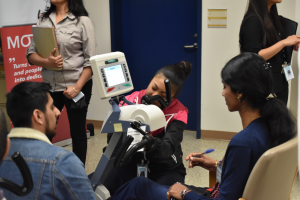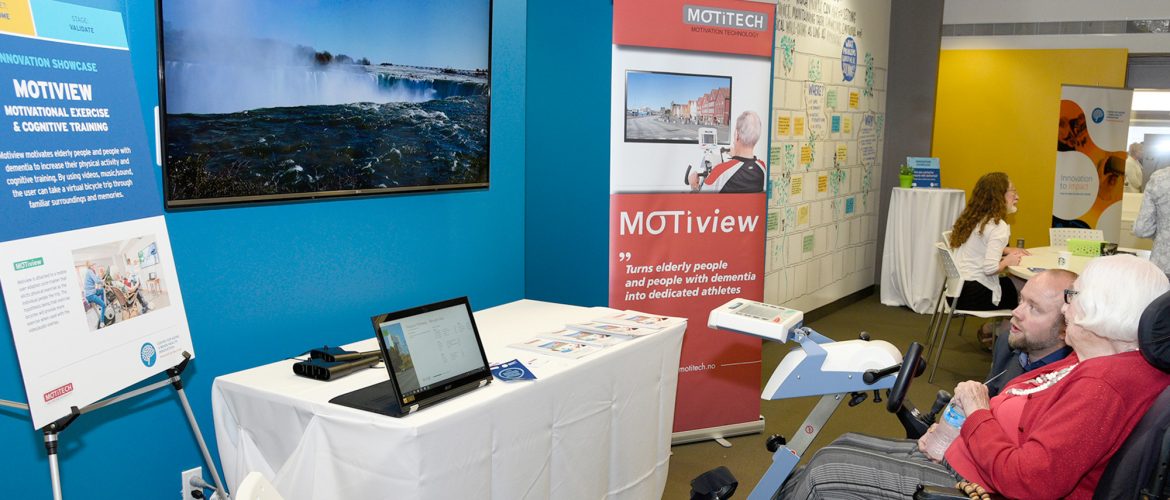UPDATE – CABHI had the opportunity to connect with an older adult named Isabella, a long-term care resident at Toronto’s West Park LTC who experienced Motiview ahead of the trial slated to begin in early 2018.
Isabella has been physically inactive for a number of years. In fact, it’s been more than 10 since she’s biked outdoors. When Isabella was first introduced to Motiview, a technology that pairs slow TV with adapted exercise bikes, she was admittedly skeptical.
“I don’t have good wind, she shares. I think I hesitated a little because I thought, “Oh, what’s the point? I’m not going to be able to do it for very long. And I’m so tired.”
However, things quickly changed once Motiview started playing a slow video of Toronto’s Beach neighbourhood. It just so happens to be the area where Isabella grew up. The West Park resident felt like she was transported back to her childhood and young adult years.
“I just loved [using Motiview],” says Isabella. “I loved it because I got a view finder that was all about the Beach area, the area that I used to ride my bicycle. It was great. I was riding my bike all over the familiar places. I rode further than I would usually on one of these bikes. Usually, it’s so boring that I would get off. But I actually spent a good five minutes on it, which is great considering my lung capacity. It was a long time.”
Staff at West Park confirmed that Isabella biked the equivalent of 3 kilometres. “It just passed like no time because I was looking at familiar places,” she says. “I got quite a bang out of it.”
Isabella adds that using Motiview “brought back all sorts of happy memories.” She thought about all the laneways where she learned how to bike and the times she took her eldest son on rides throughout the neighbourhood during the warm summer months. Needless to say Isabella would like to be a repeat Motiview user.
PREVIOUSLY –Slow TV, a genre that broadcasts experiences in real time (think a full journey of a train), has gained immense popularity over the last decade. But what happens when you pair slow TV with exercise bikes in the care of older adults? Will it increase a person’s motivation to exercise? A new research study supported by the Baycrest-led Centre for Aging + Brain Health Innovation (CABHI) is hoping to find out.

Staff members at Baycrest engage with Motitech’s technology during an information session.
Last week, the Norwegian team responsible for the technology came to Baycrest Health Sciences, one of three Canadian trial sites, to address a group of interested staff about their device. The other two sites include Ottawa’s Bruyre Research Institute and West Park Healthcare Centre in Toronto, making this the largest study ever conducted on Motiview (Motitech’s technology).
“The project will focus on evaluating the use of Motitech’s technology and how that influences user participation and motivation for physical activity,” explains Fidelma Serediuk, the primary site investigator and Baycrest’s manager & practice chief of physiotherapy.
While this is the first trial of Motiview in Canada, the technology is currently being used throughout Europe. It started back in 2012 when now-CEO of Motitech, Jon Ingar Kjenes, was approached by a Norwegian municipality to collaborate on a project. The goal was to motivate seniors, including those experiencing dementia, to live more active lives.
The precursor to Motiview was trialled with 25 participants in the municipality of Bergen who were experiencing dementia and living in long-term care facilities. The videos were tailored to the streets that participants were familiar with, adding a meaningful element.
“There were several benefits registered after the three months,” shares Jon. “They saw a reduction in aggressive behaviour along with a decrease in medication for pain and for depression. There was also a reduction in anxiety and a great decease in falls incidences.”
The study that’s currently underway in Canada includes content that’s tailored to local seniors.
“We’re going to be implementing the use of Motiview in both our geriatric day hospital as well as our long-term care setting,” shares Dan McEwen, a post-doctoral fellow at Bruyre who will be working on the study. “We’re very excited to implement this project and look at whether the use of Motiview encourages increased physical activity in this population.”
Roald Kvam, a senior advisor for Motitech, is also excited about the opportunity. He adds that the Canadian study is much larger than its Norwegian counterpart.
“It’s international, it’s multi-site. And it will collect a huge amount of data that we can analyze and build on,” says Roald. “We are so thankful to be on this journey together with CABHI.”
The 18-month study is still in it’s initial stages. Stay tuned for more updates as the study progresses and check out the video below to learn more about the unique technology.


